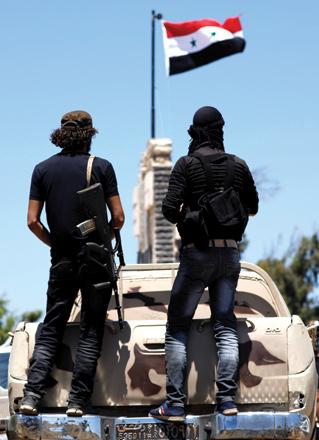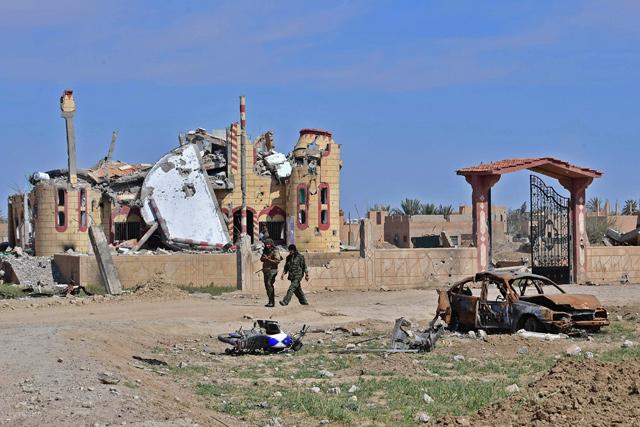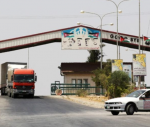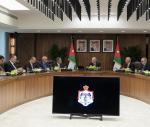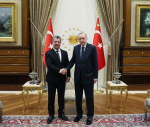You are here
Syria Kurds face tough talks to preserve autonomy
By AFP - Aug 09,2018 - Last updated at Aug 09,2018
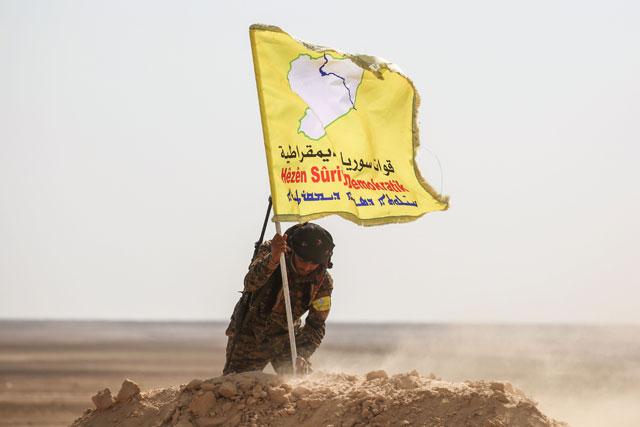
In this file photo taken on February 8, 2017, a member of the Syrian Democratic Forces (SDF), made up of US-backed Kurdish and Arab fighters, raises a flag of the SDF near the village of Bir Fawaz during their offensive to retake the former Daesh stronghold in Syria (AFP photo)
QAMISHLI — Syria’s Kurdish minority, hailed as an indispensable Western ally during the war against the Daesh group, faces hard bargaining with Damascus to save its hard-won autonomy.
Early last year, President Bashar Assad’s government held just 17 per cent of Syrian territory and was unable to do anything about the autonomous institutions the Kurds have set up in areas under their control.
But a succession of Russian-backed victories over the militants and a range of rebel factions has transformed the balance of power.
Assad’s government now controls nearly two-thirds of Syria and is determined to reassert its authority over Kurdish-held territory, which forms the lion’s share of the rest.
Recognising their weakened position, Kurdish leaders and their supporters last month opened talks with Damascus, desperate to salvage what they can of the institutions they painstakingly built over the years.
“We are trying to preserve everything we built in terms of the autonomous system, the institutions, the democracy,” said leading Kurdish figure Saleh Muslim.
“But there’s a mentality that won’t accept this right away, so it has to happen gradually,” Muslim told AFP.
Before the start of Syria’s civil war in 2011, the Kurds were an oppressed minority in what was effectively a one-party state with an Arab nationalist ideology that had no tolerance for Kurdish traditions or the Kurdish language.
Hundreds of thousands did not even have Syrian citizenship.
But after government troops withdrew from Kurdish-majority areas in 2012, local authorities began forming their own security forces and institutions, including a Kurdish-language school curriculum.
Trying to reconcile those institutions with the system in force in government-held areas will be a formidable task.
“Syria will not go back to what it was. There needs to be decentralised democracy,” Muslim said.
“We have our project, which we believe will be a model for all of Syria — and we’re holding onto it.”
‘Everything recalculated’
In late July, Damascus hosted the first round of talks with the Kurdish administration. Joint committees were formed to discuss economic issues, politics, military affairs and public services.
The ultimate goal was “drawing a roadmap that leads to a decentralised Syria,” says the political arm of the Syrian Democratic Forces (SDF), the Kurdish-led alliance which Washington backed against Daesh.
Between them, the SDF and its allies control around 30 per cent of Syria, including several of its largest oil fields.
“The government and Kurdish-led SDF are the two players that control the vast majority of Syrian land,” said Mutlu Civiroglu, an analyst in Kurdish affairs.
“One way or another, these two forces will find a solution. Either they fight, or they do it peacefully.”
The Kurds are ready to negotiate because of President Donald Trump’s repeated pledges to end the US troop presence in northern Syria that has been their principal protection.
In late May, Assad gave the Kurds a stark choice, warning that if talks fail, “we’re going to resort... to liberating those areas by force”.
Nonetheless, the Kurds feel they have a strong negotiating position.
“We had never been part of the equation, but today, everything has been recalculated... We will defend what we established,” Muslim said.
‘Red line’
As momentum builds, the talks’ main stumbling block remains how much power Damascus will have over areas that have been under Kurdish administration for as many as six years.
Other points of contention include whether to retain Kurdish-language education in the north and the fate of the SDF and other Kurdish armed groups.
“They are not going to agree to go back to the old days. This is the red line from the Kurdish point of view,” Civiroglu said.
Ilham Ahmad, who headed the Kurdish delegation to Damascus last month, told AFP self-rule was one of “the things we won from fighting Daesh and confronting tyranny”.
But the central government will not relinquish control over nearly one-third of its territory so easily, and wants state institutions to return in force.
“The Syrian state will not accept an autonomous administration,” said Damascus-based analyst Bassam Abou Abdallah.
Instead, the Kurds should content themselves with the provisions of an as yet unimplemented law granting more powers and responsibilities to municipalities, he told AFP.
Abou Abdallah said Syrian Kurdish armed groups would eventually be “dismantled”.
The head of the SDF delegation denied the subject was even discussed.
With such entrenched opposing views, the talks are likely be drawn out, said Haid Haid, of London-based think tank Chatham House.
“Emboldened by its recent military gains, the regime appears more determined than ever to prevent the establishment of parallel centres of authority in Syria,” Haid recently wrote.
“The huge gap between what the two sides are trying to achieve makes it difficult to imagine they will be able to reach a substantive agreement any time soon.”
Related Articles
QAMISHLI — A US-backed Kurdish-led alliance said on Saturday that it is seeking a roadmap for a decentralised Syria in talks with the govern
BEIRUT — Now the Daesh group's "caliphate" has fallen, the hard-won limited autonomy of Syria's Kurds will be left in peril if their key US
BEIRUT — Turkey's decision to send troops into Syria is a last-ditch bid to prevent the realisation of its worst nightmare: the creation of


